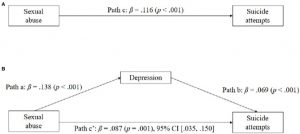Spirituality is Associated with Fewer Suicide Attempts
By John M. de Castro, Ph.D.
“spirituality can engender the perspective that things happen for some reason and serve a greater purpose. This, in turn, deploys our attention toward the potential for a brighter future, which can create a sense of optimism even when one’s situation seems dire.” – David Rosmarin
Around 43,000 people take their own lives each year in the US. Someone dies from suicide every 12.3 minutes. Worldwide over 800,000 people die by suicide every year. The problem is far worse than these statistics suggest as it has been estimated that for every completed suicide there were 12 unsuccessful attempts. In other words, about a half a million people in the U.S. attempt suicide each year. Yet compared with other life-threatening conditions there has been scant research on how to identify potential suicide attempters, intervene, and reduce suicidality.
Depression and other mood disorders are the number-one risk factor for suicide. More than 90% of people who kill themselves have a mental disorder, whether depression, bipolar disorder or some other diagnosis. So, the best way to prevent suicide may be to treat the underlying cause. For many this means treating depression. Spirituality may help to provide meaning and prevent suicide. But there is scant research on the relationship of spirituality and religiosity and suicide.
In today’s Research News article “Factors Related to Suicide Attempts: The Roles of Childhood Abuse and Spirituality.” (See summary below or view the full text of the study at: https://www.ncbi.nlm.nih.gov/pmc/articles/PMC8044867/ ) Tae and Chae recruited patients with anxiety or depressive disorders and had them complete measures of suicide attempts, anxiety, depression, childhood trauma, spiritual well-being, and social support. 25% of the participants indicated that they had attempted suicide.
They found that in comparison to non-suicide attempters, the participants who had attempted suicide had significantly higher levels of anxiety, depression, emotional, physical, and sexual abuse, and emotional and physical neglect and significantly lower levels of spirituality and social support. A hierarchal regression revealed that a high level of emotional abuse and a high level of sexual abuse as well as low spirituality predicted suicide attempts. A mediation analysis revealed that childhood emotional, sexual abuse, and low spirituality were all significant direct predictors of suicide attempts and also significant indirect predictors such that abuse and low spirituality were associated with higher levels of depression which, in turn was associated with suicide attempts.
These results are correlational. So, no conclusions concerning causation can be reached. But the associations are clear. Depression, childhood emotional and sexual abuse, and low spirituality are all associated with suicide attempts. It is also clear that in addition to being directly associated with suicide attempts, childhood emotional and sexual abuse, and low spirituality also are associated with higher levels of depression which, in turn, is associated with suicide attempts.
Childhood emotional and sexual abuse are clearly risk factors for suicide and should be viewed as red flags in evaluating a patient. But these abuses occurred in the past and cannot be changed. Spirituality on the other hand can change. There are many religious and contemplative practices that can improve spirituality. The present results suggest that this may be helpful and lowering depression and preventing suicide. Future research is needed to investigate this idea, that increasing spirituality can decrease suicide risk.
So, spirituality is associated with fewer suicide attempts.
“I personally think spirituality is a part of each of our beings. It has been the difference in my life and has walked me back from the place where I thought suicide was my only option.” – Kelli Evans
CMCS – Center for Mindfulness and Contemplative Studies
This and other Contemplative Studies posts are also available on Google+ https://plus.google.com/106784388191201299496/posts and on Twitter @MindfulResearch
Study Summary
Tae, H., & Chae, J. H. (2021). Factors Related to Suicide Attempts: The Roles of Childhood Abuse and Spirituality. Frontiers in psychiatry, 12, 565358. https://doi.org/10.3389/fpsyt.2021.565358
Abstract
Objectives: The purpose of this article was to identify independent factors associated with suicide attempts in patients with depression and/or anxiety.
Background and Aims: This study was conducted in order to examine whether risk and protective psychological factors influence the risk of suicide attempts among outpatients with anxiety and/or depressive disorders. In this regard, explanatory models have been reported to detect high-risk groups for suicide attempt. We also examined whether identified factors serve as mediators on suicide attempts.
Materials and Methods: Patients from 18 to 65 years old from an outpatient clinic at Seoul St. Mary’s Hospital were invited to join clinical studies. From September 2010 to November 2017, a total of 737 participants were included in the final sample. The Beck Depression Inventory (BDI), State-Trait Anxiety Inventory (STAI), Childhood Trauma Questionnaire (CTQ), Functional Assessment of Chronic Illness Therapy-Spiritual Well-being Scale (FACIT-Sp-12), and Functional Social Support Questionnaire (FSSQ) were used to assess psychiatric symptoms. An independent samples t-test, a chi-square test, hierarchical multiple regression analyses, and the Baron and Kenny’s procedures were performed in order to analyze data.
Results: Young age, childhood history of emotional and sexual abuse, depression, and a low level of spirituality were significant independent factors for increased suicide attempts. Depression was reported to mediate the relationship between childhood emotional and sexual abuse, spirituality, and suicide attempts.
Conclusions: Identifying the factors that significantly affect suicidality may be important for establishing effective plans of suicide prevention. Strategic assessments and interventions aimed at decreasing depression and supporting spirituality may be valuable for suicide prevention.
https://www.ncbi.nlm.nih.gov/pmc/articles/PMC8044867/
